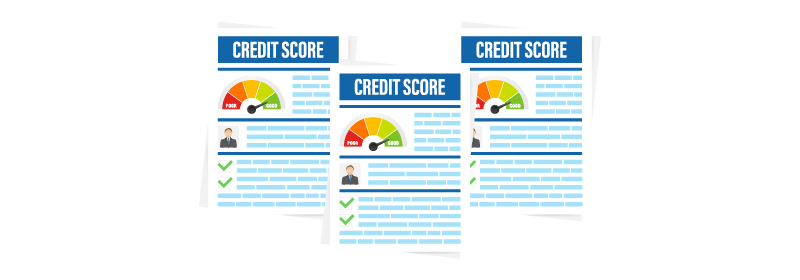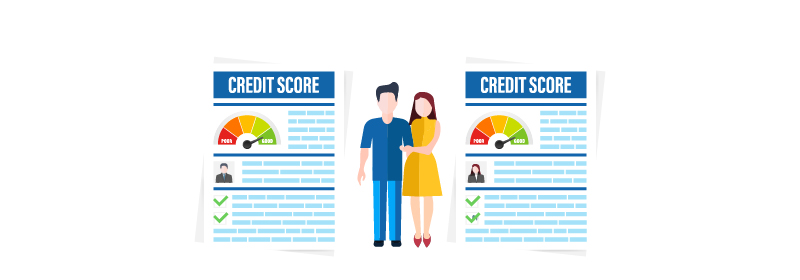- Published on: 30 Jul 2022
- Last updated on: 23 Sep 2025
- Post Views: 5341


A credit score is one of the most important factors considered by any lender when you apply for a loan or credit card. A healthy credit score is a key to your creditworthiness. However, due to a lack of knowledge, we all tend to believe a few myths related to credit scores as we find it difficult to validate the applicability of such myths.
Read the blog to know the truth behind a few common myths associated with a credit score and how you must act to have a healthy credit score:
1. Checking your Credit Score Lowers It: This is one of the most common misconceptions related to a credit score. When you check your credit score, it is considered to be a ‘soft inquiry’ and does not harm/lower your credit score. In fact, keeping a regular check on your credit score helps you to look out for errors (if any) and take necessary steps to improve/maintain it.

On the other hand, when you apply for a loan with multiple lenders and they check your credit score, it is marked as a ‘hard inquiry’. And getting too many ‘hard inquiries’ from multiple lenders within a short period may impact your credit score negatively and may indicate your credit hungriness.
2. A Credit Score Depends on Your Annual Income:

A credit score is calculated based on the information that is mentioned in your credit report and your income is not even a part of it. Therefore, a person can have a poor credit score of 650 with an annual income of Rs. 20 lakhs. Likewise, it is also possible for a person to have a healthy credit score of 760 with an annual income of Rs. 3.5 lakhs.
Some of the factors on which your credit score depends are repayment of loans/credit card bills, credit mix of both secured and unsecured loans, credit utilization ratio, etc.
3. A Debit Card Helps to Build Your Credit Score: A debit card does not offer any credit and purchasing anything using your debit card means using the money you have in your bank account. Debit cards are not even a part of your credit report and do not impact your credit score in any manner.

On the other hand, a credit card plays a huge part when it comes to impacting your credit score (both positively and negatively). As a credit card is a form of credit taken from a bank, it is important to pay its EMIs on time if you wish to maintain a healthy credit score.
4. Lower Credit Score Means Rejection of Your Home Loan:

A low credit score may have an impact on the outcome of your loan application but that doesn’t mean that your loan application will be necessarily rejected. If the banks are not willing to offer you a loan, there are many NBFCs available in the market that may offer you a loan.
The credit score is one of the important factors considered by lenders but there are many other factors too like age, income, nature of work, etc. that can help you to avail yourself a good deal on your loan application.
5. An Individual Can Have Only One Credit Score: If you panic after seeing different credit scores on different platforms, stop doing it right now. It is completely normal for an individual to have more than one credit score.

Different lenders submit your financial records to different credit bureaus. And as lenders are not required to report to all the bureaus, your report may be different with each bureau.
6. Your Spouse’s Credit Score Can Impact Yours: Your marital status has nothing to do with your credit score. A credit score is determined only after considering an individual’s repayment history and even having a joint bank account cannot merge your credit score with that of your spouse.

Also, if you are applying for a loan with your spouse as a co-applicant, each partner’s credit score is considered by the lender. If you fail to pay the EMIs on time, both your individual credit scores will be negatively impacted and vice-versa.
A credit score plays a vital role when it comes to summarising your financial health. Therefore, it is not only important to have a healthy credit score but also to stay away from all the misconceptions related to it.
DMI Finance brings to you the best information about the finance industry, cyber security, cyber scams/frauds and a lot more.
Read the DMI Finance Blog and stay connected with us on Facebook, LinkedIn, Twitter, and YouTube for such interesting information.
FAQs
Is it true that looking at your credit score lowers it?
No, looking at your credit score will not lower it. However, if too many lenders check your credit score in a short span of time, it may get negatively impacted.
How do you get a good credit score?
To get a good credit score, you must:
How many times can I check my credit score without hurting it?You can check your credit score as many times as you want to, and it won’t get hurt.What is a good credit score?
A credit score of 750 and above is considered to be a good credit score.
What factors ruin your credit score?
The factors that can ruin your credit score are:


